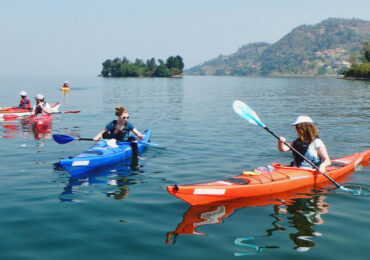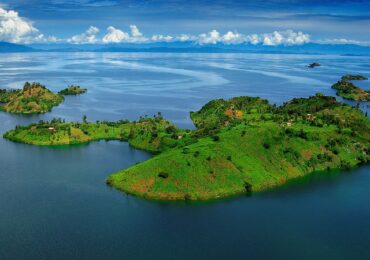- 2
- 5
- 7
- 5
- 1
- 2
- 1
- 1
- 2
- 1
- 1
- 3
- 3
- 4
- 2
- 2
- 4
- 4
- Jan
- Feb
- Mar
- Apr
- May
- Jun
- Jul
- Aug
- Sep
- Oct
- Nov
- Dec

 Where the green hills of Rwanda ripple into the horizon and the sky meets the shimmering water, you’ll find Lake Kivu—a peaceful paradise cradled between the towns of Rubavu, Karongi, and Rusizi. Stretching along Rwanda’s western border with the Democratic Republic of Congo, Lake Kivu is one of Africa’s Great Lakes, but unlike most, its shores are calm, warm, and free of hippos and crocodiles—perfect for swimming, kayaking, or simply doing nothing at all.
Where the green hills of Rwanda ripple into the horizon and the sky meets the shimmering water, you’ll find Lake Kivu—a peaceful paradise cradled between the towns of Rubavu, Karongi, and Rusizi. Stretching along Rwanda’s western border with the Democratic Republic of Congo, Lake Kivu is one of Africa’s Great Lakes, but unlike most, its shores are calm, warm, and free of hippos and crocodiles—perfect for swimming, kayaking, or simply doing nothing at all.
For travelers craving a restorative break between gorilla trekking in Volcanoes or chimp tracking in Nyungwe, Lake Kivu is the country’s best-kept secret. Here, you’ll find a place where time slows, birds sing over breakfast, and boats drift lazily across golden waters at sunset. But beyond its beauty, Lake Kivu is also a window into Rwanda’s culture, history, and the lives of the people who call its shores home.
Lake Kivu offers a blend of barefoot luxury and local charm. In Rubavu (Gisenyi), elegant boutique hotels and eco-lodges line the waterfront with stunning views, fresh fish dinners, and serene garden settings. In Karongi (Kibuye), visitors are treated to peaceful island-dotted bays, where charming guesthouses perch above the lake and fishermen sing traditional songs as they paddle past at dawn.
Whether you choose a high-end stay like Cormoran Lodge, Kivu Serena Hotel, or a cozy eco-retreat, you’ll be surrounded by lush hills, warm hospitality, and the soothing rhythm of lake life. It’s a perfect setting to relax, recharge, and reflect on your journey through Rwanda.
For those who want more than a view, Lake Kivu invites you to explore with purpose. Kayaking along the coastline reveals hidden coves, palm-fringed inlets, and friendly villages. Boat trips to nearby islands—like Napoleon Island, home to a colony of fruit bats, or Amahoro Island, known as “Peace Island”—offer unique insights into the lake’s quiet wonders.
Guided coffee tours into the surrounding hills introduce travelers to Rwanda’s thriving coffee cooperatives, where you can see every step of the bean-to-cup process and meet the farmers behind the brew. In the evening, visit lakeside communities and enjoy traditional dances, basket weaving demonstrations, or storytelling sessions around a fire. Here, tourism isn’t separate from local life—it’s woven into it.
Lake Kivu isn’t just scenic—it’s essential to Rwanda’s ecosystem and people. The lake is a major source of fishing, energy, and agriculture, supporting thousands of livelihoods. Its calm waters provide a place for reflection, healing, and connection. After the emotional highs of gorilla trekking or the intensity of Nyungwe’s trails, Kivu feels like a gentle exhale—a chance to be still and let the beauty around you settle in.
In many ways, it’s the soul of western Rwanda. Whether you’re sharing fresh sambaza fish with locals, watching children play by the shore, or sipping coffee as fishermen cast their nets at dawn, you begin to feel not just like a visitor, but a welcomed guest in a place that gives more than it takes.
Lake Kivu is not a place you rush through—it’s a place you sink into. A sanctuary between Rwanda’s forests and cities, it offers everything: relaxation, soft adventure, cultural connection, and natural wonder. For conscious travelers looking to rest, connect, and explore sustainably, this lakeside haven is not just a destination—it’s a state of mind.
Come float. Come listen. Come feel the soul of Rwanda by the water’s edge.